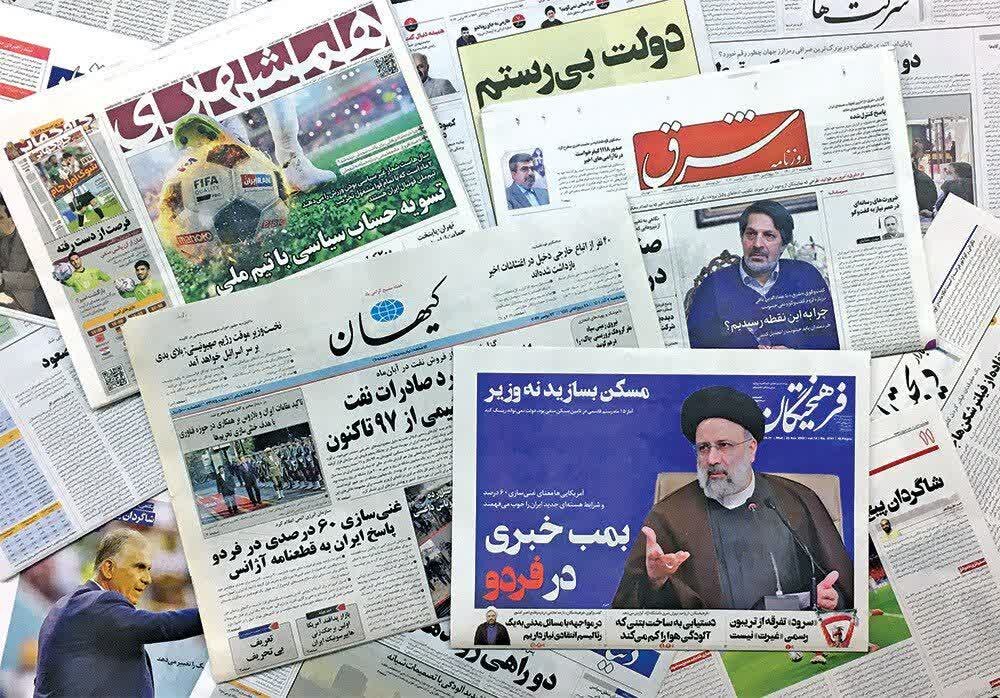BRI is a trans-economic plan for Iran

The Belt and Road Initiative (BRI) is not just an economic plan but it has trans-economic nature, the Quds newspaper writes, Quds writes.
Iran's participation in the initiative is not only a step towards reducing the economic sanctions pressure but also an effective strategy to neutralize the non-economic goals of the sanctions.
In recent years, the United States wanted to ignore Iran's geopolitical advantages and opposed the passage of any corridor through Iran.
Iran's participation in the BRI project can defeat the U.S. plot to exclude Iran from international routes.
Arman-e- Melli: Market reacts correctly
In an article in Arman-e-Melli, university professor Ali Bigdeli writes: The visit of the Iranian president to China was just a political showoff, and it will not have economic outcomes. The reality is that we are not in good conditions economically.
So, it is not possible to continue such a situation, and economic discontent will increase in the country, and Iran's problems in the international arena will also increase. With a managed trip, like Mr. Raisi's visit to China, which, of course, will not result in tangible economic results, Iran tries to solve its domestic problems and show its importance to foreign powers.
The reality is that if China was interested to invest in Iran, the price of foreign currencies should fall because the market reacts correctly in such situations.
Now that the price of foreign currencies is increasing, it can be concluded that the trip will not achieve any results and is only a political maneuver.
Aftab-e- Yazd: Deepening strategic relations between the two civilizations
Aftab-e- Yazd writes: Ebrahim Raisi traveled to China on Monday (Feb. 13). During the trip, he called for deepening strategic relations between the two countries.
The truth is that China, which is on the verge of becoming an economic, and political superpower in the world, capitalizes on its political and diplomatic relations only when it receives tens of times of profit. At the political level, we noticed the joint statement during Xi Jinping’s recent trip to the Arab countries of the Persian Gulf. At the same time, the statistics on China's economic relations with Iran shows that China has significantly reduced its investments in Iran over one-and-half years. Above all, international observers believe that the president's visit to Beijing can provide the basis for deepening relations between Tehran and Beijing, but public opinion expects that the deepening of relations will develop based on national interests and real achievements in a way that is tangible for society.
IRAN: An inevitable path in BRI
The IRAN newspaper writes: The "Belt and Road Initiative (BRI) was presented by Chinese President Xi Jinping in 2013.
The BRI, which needs reliable partners along the way to ensure its westward movement, will have difficulty without Iran's cooperation.
Iran's participation in the BRI project will strengthen its position. Moreover, the East-West and North-South transit routes from Iran will turn Iran's security into an important issue in regional equations.
Javan: Tehran-Beijing, complementary relations
Pointing to Tehran-Beijing relations, the Javan newspaper writes: China seeks to develop safe commercial and economic relations with countries and often does not seek to interfere in the internal affairs of other countries. This is one of the advantages of China's foreign policy. On the other hand, China is an emerging power whose dependence on energy is very high, and Iran is one of the main suppliers of energy. This "economic complementarity" is a logical reason for the development and deepening of Tehran-Beijing trade relations. The President's visit to China took place while the Westerners were trying to put pressure on Iran by turning the nuclear talks into an erosive process and undermining it, but deepening relations with China will invalidate the West's calculations.
The domineering system had tried to present Iran as the loser of the "Look to the East" approach by highlighting the economic relations of Arab and Western countries with China, but what angered the West is a shift in governance from the West to the East and the establishment of a new world order.
Resalat: Big step of the 13th government to create more convergence
Abbas Moqtadaei, the vice chairman of the National Security and Foreign Policy Committee of the Parliament, in an interview with Resalat, said: The results of the meeting between the presidents of Iran and China will not be limited to the two countries, and even the Asian region; rather it will influence the whole world.
He added: Now the shift of power, especially in the economic field, is moving fast from the West to the East. Referring to Iran's membership in the Shanghai Organization, and Tehran’s all-out relations with Moscow and New Delhi, Moqtadaei said: "There is no doubt that the results of the cooperation are in favor of international peace and security. It seems that China's action in inviting the Iranian president was to greenlight more cooperation. Now it is obvious that Europe is repentant as it failed to fulfill its agreements with Iran.
At the same time, the Islamic Republic of Iran can quickly make the sanctions more ineffective by having a greater presence in Asia.
Leave a Comment